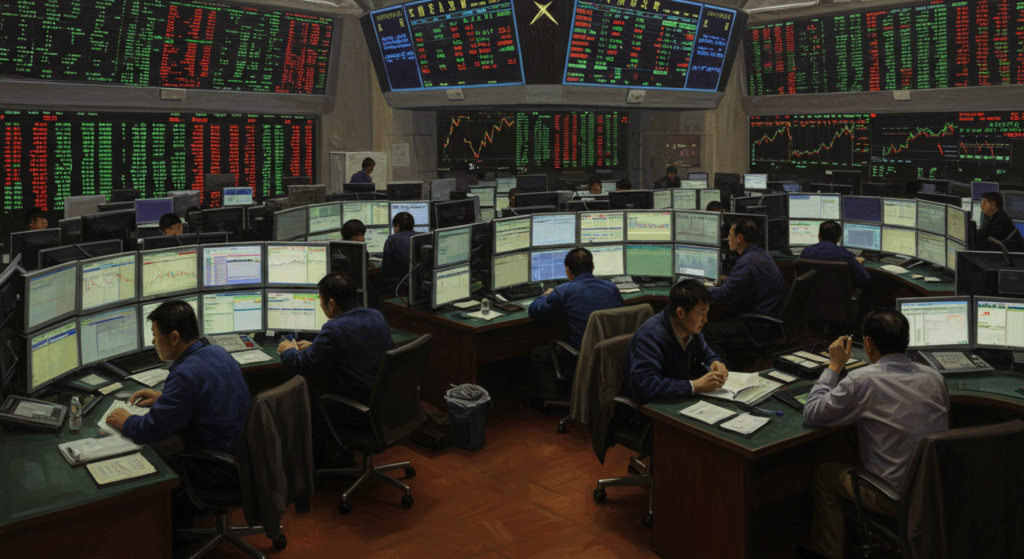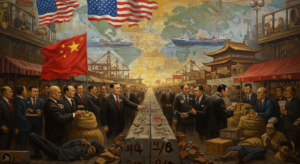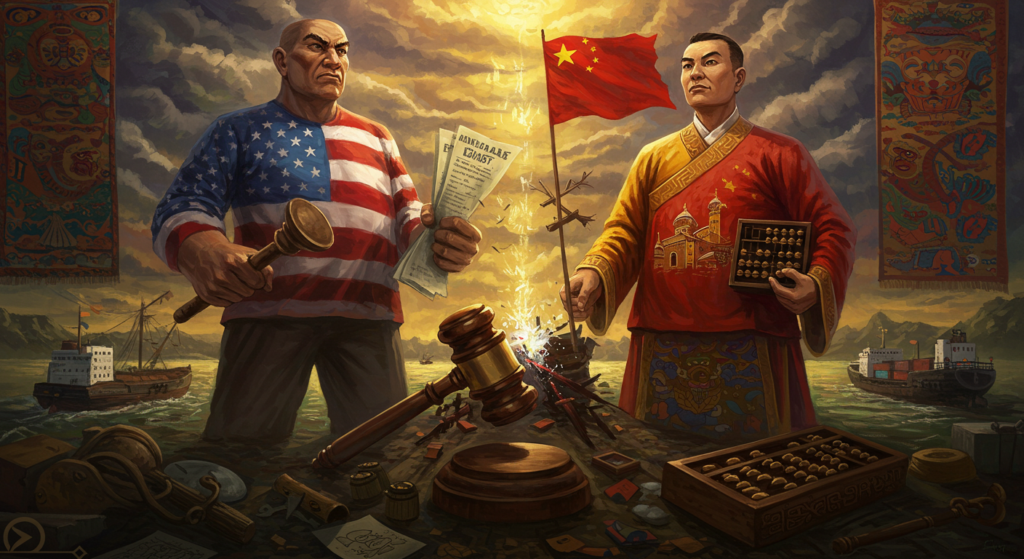China’s Retaliation: A 34% Tariff
Anonymous Commentator:
We’ve been talking about tariffs for a while now. China has responded to the U.S. with a major move—a 34% retaliatory tariff. Honestly, can you blame them? What did we expect? That’s their response, but there’s more beneath the surface. Eric sent me a story that hasn’t gotten much attention. We’ll start with the 34% retaliation and unpack it from there.
Is China Coming to the Table?
CMTV News Source:
Is China coming to the negotiating table? Depends which table you mean. If you’re talking about the ring, yes—China’s stepping in, gloves off. Up until now, President Xi Jinping had urged calm, but it seems they’ve had enough. The 34% tariff on U.S. goods takes effect April 10. That’s not all—China’s added U.S. defense firms to its entity blacklist, banned imports of chicken and sorghum from certain American companies, and imposed tighter restrictions on rare earth exports, which are essential to the tech industry.
Apple, for instance, already shifted some production out of China after the first trade war under the “China Plus One” strategy, moving manufacturing to India, Vietnam, Thailand, and Taiwan. But with Trump’s renewed tariffs, all these regions are getting hit too. China is trying to rebalance its economy by increasing domestic consumption and managing industrial overcapacity. Market watchers are closely observing the yuan, which has weakened to its lowest level since February. If China chooses to weaponize its currency further, it could escalate the conflict dramatically.
Trump’s Response: A 50% Tariff Hike
Anonymous Commentator:
China hit us with a 34% tariff, and now Trump’s firing back with a 50% increase on Chinese imports. That’s a full-on trade war. I’m not joking. This will absolutely affect us. We import a lot from China. Prices will rise, no doubt.
Trade War Escalates to 104% Tariffs
CMTV News Source:
President Trump is threatening to raise tariffs to 104% on Chinese imports if China doesn’t remove its 34% tariff. Janice Mackey Frayer, reporting from Beijing, says China’s response is defiant. They’re ready to match the U.S. move-for-move. A 104% tariff would affect everything—clothing, electronics, household goods.
Timu, Tech, and Rising Prices
Anonymous Commentator:
104% tariffs? That’s wild. Someone in the chat already said it—Timu won’t be cheap anymore. Electronics are another big concern—laptops, iPhones, iPads. Most of that is made overseas. If you work in tech or any field where electronics are critical, this is dangerous. Trump thinks he’s playing a video game—Mortal Kombat or Street Fighter—but this is real life. We can’t afford these hits. If you break your iPhone screen, good luck replacing it. I’ve never cracked my Android, but I know plenty of iPhone users who have.
Billionaires are feeling it too. Bill Ackman, for example, has spoken out. Even they’re starting to feel the squeeze.
 China’s Perspective: U.S. “Blackmail”
China’s Perspective: U.S. “Blackmail”
CMTV News Source:
This trade war isn’t just U.S. vs. China—other Asian nations like Japan, Vietnam, Cambodia, and South Korea are caught in the crossfire. China views U.S. tactics as “blackmail” and sees negotiation as legitimizing Trump’s strategy. A Chinese foreign ministry spokesperson confirmed there are currently no trade talks underway with the U.S., citing a lack of genuine intent from Washington.
To stabilize their markets ahead of these tariff deadlines, China rolled out measures like state-owned company buybacks—known locally as the “national team”—which temporarily boosted stock performance. But with more tariffs hitting in 48 hours, supply chains are under major threat, and U.S. consumer prices are bound to rise.
Manufacturing & the Materials Problem
Anonymous Commentator:
Let’s talk about manufacturing. People love to say, “bring manufacturing back to the U.S.,” but it never should’ve left. Deals like NAFTA put us in this position. Even American-made products often rely on raw materials from countries like China and Mexico.
Building factories here isn’t enough. We need the machines that make the products—and those machines are made overseas too. That’s the real issue. We don’t just need factories. We need to manufacture the machines used in factories—and we’re not doing that.
So yeah, if you’re in manufacturing, this will hit you too. Machines, tools—everything will cost more. Everyone is going to feel the impact. We really don’t make things in the U.S. anymore, not even the things that make things.
What Does “Fight to the End” Mean?
CMTV News Source:
Joining us now is former State Department and CIA official Ned Price. Ned, what does “fight to the end” look like from China? His answer: nothing good for American businesses or consumers.
Trump’s aggressive tariffs may have emboldened China. Rather than using tariffs as leverage for negotiation, he’s treating them as the goal itself. And Xi Jinping—though not democratically elected—is still concerned about legitimacy and legacy. Trump’s left him with no face-saving off-ramp. Now China is fully prepared to retaliate.
The Bigger Picture: Dominance vs. Multipolarity
Anonymous Commentator:
Let’s keep it real. We don’t have China’s technology. This is not the country to pick a fight with. Why not collaborate instead of always pushing conflict?
The U.S. government wants to dominate globally, but those days are fading. Countries are joining BRICS, moving toward a multipolar world. And there’s nothing wrong with that. Even the Black Panthers supported a horizontal model. Why can’t we work with others to build a better future?

China Quietly Moves: Critical Minerals Cut
Anonymous Commentator:
Now here’s something that really flew under the radar—and you can read about it on CleanTechnica.
In April 2025, while the world focused on tariffs, China quietly cut off supplies of critical minerals—dysprosium, terbium, tungsten, indium, and yttrium. These minerals are essential. Without them, EVs don’t run, fighter jets don’t fly, and solar panels are just expensive tiles. These elements are on risk registers for a reason—they matter in both war and clean energy innovation.
 Cmtv News News -Education – Entertainment – Sports
Cmtv News News -Education – Entertainment – Sports







